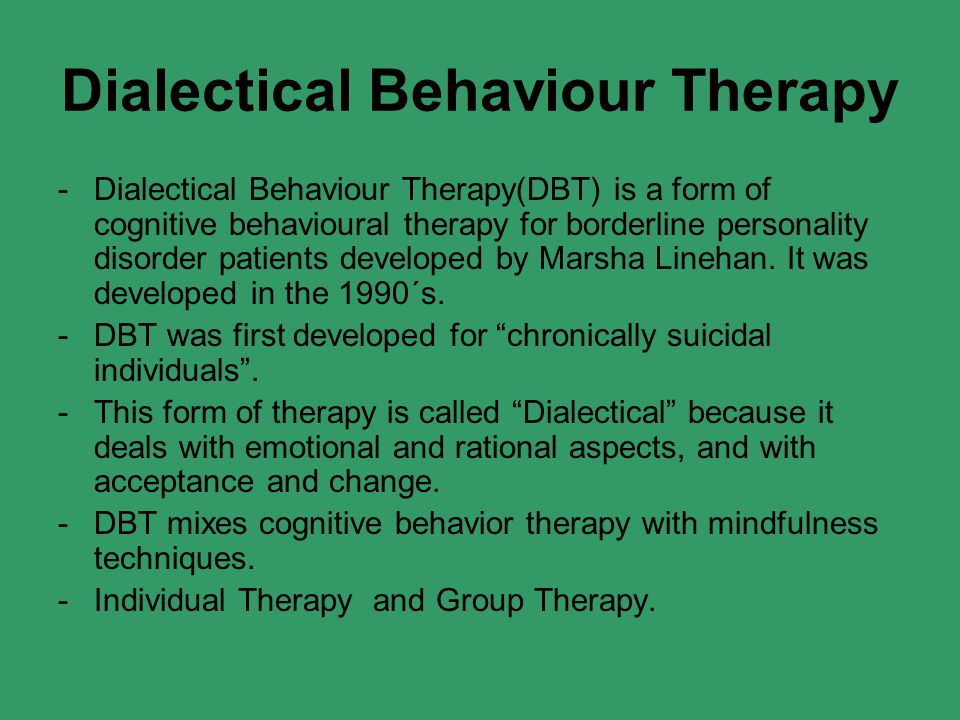Discover the Transformative Power of DBT London Treatment Procedure
Equipping Individuals Through Effective Dialectical Behaviour Therapy (DBT) Providers: Structure Stronger Mental Health Foundations
In the realm of psychological health and wellness, the relevance of empowering individuals through efficient Dialectical Practices Treatment (DBT) solutions can not be overstated. By concentrating on the core principles of DBT, such as enhancing psychological law skills, improving social effectiveness, building distress tolerance techniques, and growing mindfulness techniques, people can embark on a journey in the direction of building more powerful mental health foundations.
Understanding the Core Principles of DBT


One core principle of DBT is validation. Specialists making use of DBT acknowledge the person's feelings and habits as valid feedbacks to their environment. This recognition aids build a strong restorative partnership and encourages patients to function in the direction of modification. One more basic facet is dialectics, which shows individuals to view situations from multiple perspectives and locate the synthesis in between conflicting ideas or emotions.
Additionally, the principle of dialectical abstinence is central to DBT. This concept motivates people to avoid suicidal habits while likewise accepting themselves. By recognizing and integrating these core principles, therapists can effectively execute DBT techniques and assistance people in their trip in the direction of psychological policy and psychological well-being.
Enhancing Emotional Guideline Abilities
Establishing efficiency in managing feelings is a fundamental facet of fostering emotional health and social efficiency - DBT London. Enhancing psychological regulation skills is a core element of Dialectical Practices Therapy (DBT) that furnishes individuals with the tools to navigate extreme emotions in a healthy and positive fashion. Through DBT, individuals find out to determine, recognize, and control their emotions, bring about boosted mental health outcomes
DBT emphasizes the significance of mindfulness, which entails existing in the moment without judgment. This practice permits individuals to observe their feelings without becoming overwhelmed by them, enhancing their ability to respond effectively as opposed to respond impulsively. By cultivating mindfulness, individuals can develop a greater feeling of self-awareness and emotional control.
Moreover, DBT teaches useful skills such as distress tolerance and feeling regulation techniques to aid people manage difficult emotions. By finding out these abilities, people can minimize spontaneous habits, boost decision-making, and strengthen their connections with others. Ultimately, boosting emotional regulation skills through DBT equips individuals to lead more satisfying and balanced lives.

Improving Interpersonal Efficiency
Having actually developed a solid structure in psychological policy skills within the framework of Dialectical Practices Therapy (DBT), the focus now moves towards improving social effectiveness. Improving social performance is a crucial part of DBT as it gears up people with the required abilities to navigate social communications, interact successfully, established borders, and develop much healthier partnerships.
In DBT, interpersonal effectiveness skills are educated through components that concentrate on areas such as assertiveness, efficient communication, and interpersonal problem-solving. By discovering these abilities, people can boost their capability to reveal their requirements and wishes, preserve self-esteem, and develop more powerful links with others.
Practicing mindfulness is an essential component of boosting interpersonal efficiency within the DBT framework. Mindfulness allows individuals to be existing in their communications, listen proactively, and respond attentively as opposed to respond impulsively. By incorporating mindfulness into their every day lives, people can cultivate greater self-awareness and psychological policy, which are crucial for effective interpersonal interactions.
Structure Distress Tolerance Strategies
Discovering effective techniques for taking care of emotional distress is important for individuals seeking to boost their coping skills and resilience. Structure distress resistance strategies is a crucial facet of Dialectical Practices Treatment (DBT) that encourages individuals to navigate difficult emotions without ending up being overloaded.
In addition, mindfulness methods play a substantial duty in structure distress tolerance. Mindfulness encourages people to remain present in the moment without judgment, permitting them to observe their thoughts and feelings without reacting impulsively. This awareness allows people to endure distress much more properly and develop a better sense of control over their responses.
Along with these strategies, creating an individualized distress resistance plan with the advice of an experienced specialist can supply people with a tailored strategy to handling emotional distress - DBT London. By incorporating these methods into every day life, individuals can strengthen their mental health and wellness foundations and boost their general wellness

Cultivating Mindfulness Practices
To grow their distress tolerance techniques further, people can focus on growing mindfulness techniques as a complementary method within the structure of Dialectical Behavior Treatment (DBT) Mindfulness, a key element of DBT, entails paying interest to the here and now minute without judgment. By promoting mindfulness, individuals can improve their awareness of ideas, emotions, and physical feelings, promoting a much deeper understanding of themselves and their experiences.
Mindfulness methods in DBT include methods such as conscious breathing, body scans, and observing ideas without add-on. These techniques motivate individuals to create a non-reactive position towards their internal discover this experiences, allowing them to react to challenging circumstances with higher quality and calmness. By integrating mindfulness into everyday regimens, individuals can learn to regulate their emotions extra efficiently, reduce impulsive behaviors, and cultivate a feeling of inner peace.
Through cultivating mindfulness practices, people undertaking DBT can construct a strong structure for taking care of tension, improving relationships, and boosting total health. By incorporating mindfulness right into their therapeutic journey, individuals can establish important abilities that equip them to navigate life's difficulties with resilience and self-awareness.
Final Thought
To conclude, effective Dialectical Behaviour Therapy (DBT) services play a vital role in equipping individuals to build stronger psychological health structures. By comprehending the core principles of DBT, boosting psychological law skills, improving social performance, developing distress tolerance methods, and growing mindfulness methods, individuals are equipped with the essential tools to browse their feelings, partnerships, and difficulties in a much more flexible and resilient manner. DBT solutions use a comprehensive technique to advertising mental well-being and empowering people to lead fulfilling lives.
By concentrating on the core principles of DBT, such as enhancing emotional law abilities, improving interpersonal efficiency, building distress resistance methods, and cultivating mindfulness practices, individuals can begin on a trip in the direction of building more powerful psychological health structures. Enhancing emotional regulation skills is a core element of Dialectical Practices Treatment (DBT) that outfits people with the tools to navigate intense emotions in a positive next and healthy fashion.Moreover, DBT educates practical abilities such as distress resistance and emotion policy strategies to aid people take care of challenging feelings.To grow their distress tolerance strategies even more, people can focus on growing mindfulness techniques as a complementary approach within the framework of Dialectical Practices Therapy (DBT) By recognizing the core concepts of DBT, enhancing psychological regulation abilities, enhancing social performance, constructing distress tolerance techniques, and cultivating mindfulness practices, individuals are furnished with the needed devices to browse their emotions, partnerships, and challenges in a more flexible check my source and durable fashion.